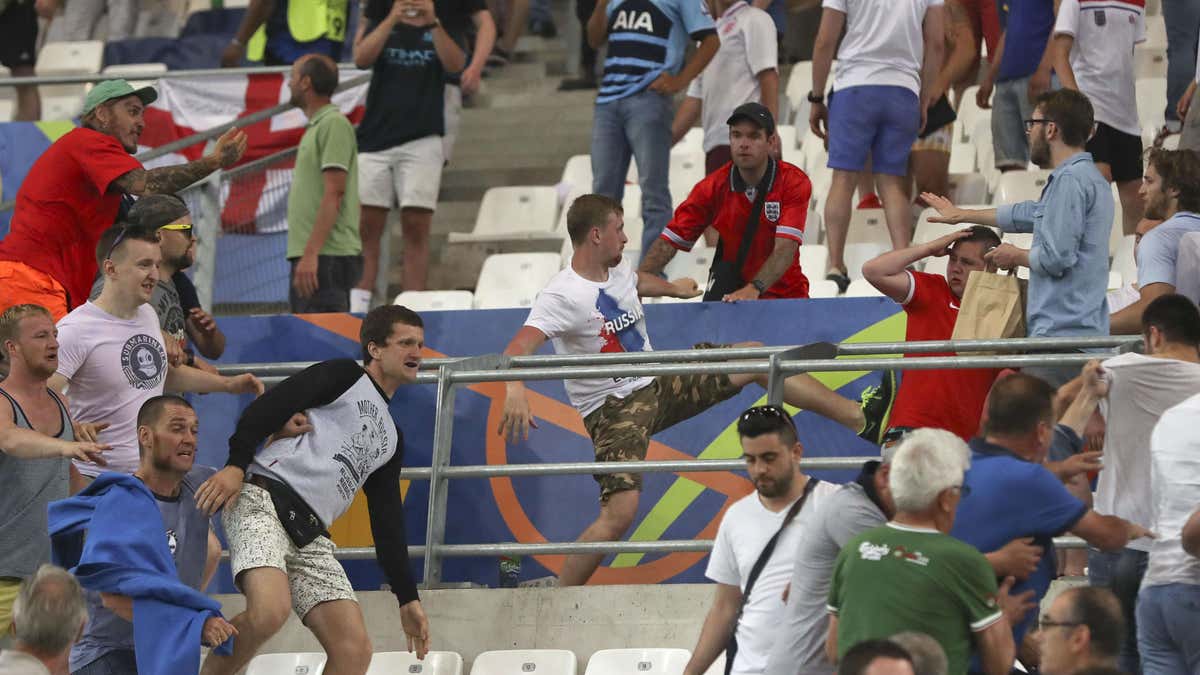
Clashes break out in the stands during the Euro 2016 Group B soccer match between England and Russia, at the Velodrome stadium in Marseille, France, Saturday, June 11, 2016. (AP)
UEFA will open disciplinary proceedings over Saturday's violence inside the stadium in Marseille, with Russia potentially facing tougher sanctions than England because its fans were in the front line of trouble at the last European Championship.
After a third straight day of fighting in the Mediterranean port city, violence spread to the Stade Velodrome at the Group B game.
That's important because it means that UEFA can impose some sort of punishment if it's so minded. Though UEFA holds national federations and clubs responsible for their fans' behavior inside stadiums, it typically does not act on incidents elsewhere.
"UEFA can only take disciplinary action for incidents which happen within the stadium perimeter," the European soccer body said in a statement.
After the 1-1 draw, a large group of Russian fans in one stand behind the goal advanced on England supporters in the neighboring area, throwing objects and breaking through a line of stewards. England fans fled for the exits.
When UEFA's disciplinary panel judges incidents at the stadium, it could take Russian fans' track record at Euro 2012 into account. UEFA imposed a series of sanctions, including fines, on the Russian FA for incidents at that tournament, which was jointly hosted by Poland and Ukraine. England is likely to be treated more leniently by UEFA as its fans have little history of disorder in recent European Championship qualifying and final tournaments.
Saturday's game was Russia's first to be organized by UEFA since the lifting of probationary sanctions that were threatened after violent disorder by its fans in Poland four years ago.
It was also the second case in recent weeks of fighting between rival fans at a high-profile UEFA-organized match. Last month, UEFA formally opened a disciplinary case two days after Liverpool and Sevilla fans clashed at the Europa League final in Basel, Switzerland.
Among the incidents back in Euro 2012, stadium security staff in Wroclaw, Poland, were assaulted by Russian fans in Russia's opening 4-1 victory over the Czech Republic. The Russian authorities were fined 30,000 euros ($37,500) for racially insulting Czech Republic defender Theodor Gebre Selassie, who is black.
In a separate Euro 2012 incident, UEFA charged and fined Russia for a fan carrying a national flag across the field after a 1-1 draw against Poland. That heavily policed match in Warsaw was played on June 12 — Russia's national holiday — after fights in the city as rival fans went to the stadium.
Four years ago, UEFA deferred a sanction of ordering Russia to play three home Euro 2016 qualifying in empty stadiums. The stadium ban would have been activated if fan violence during qualifying matches was repeated.
UEFA had initially threatened Russia with a six-point deduction in Euro 2016 qualifying but that was removed when the Russian Football Union appealed to UEFA. A fine of 120,000 euros ($150,000) was maintained though.
When UEFA's disciplinary panel judges the latest incident in Marseille, any sanction should be applied to the European Championship rather than the FIFA-organized World Cup which Russia hosts in 2018. FIFA typically has no jurisdiction over UEFA-organized events.
Russia and England are among 13 UEFA member federations hosting Euro 2020 matches, which for the first time ever will be spread around the continent.
Wembley Stadium in London was picked to host the Euro 2020 semifinals and final, while Zenit St. Petersburg's stadium is due to host three group-stage matches and a quarterfinal.
Both Russian and English national teams have to advance through a qualifying tournament rather than be given automatic entry as hosts.
Poor segregation has seemed to be a factor in the Marseille and Basel incidents.
At the Europa League final on May 18, fans were not separated by police or stewards behind one goal at the St. Jakob-Park about 30 minutes before kickoff.
UEFA will deal with charges of "crowd disturbances" against both clubs on July 21.
